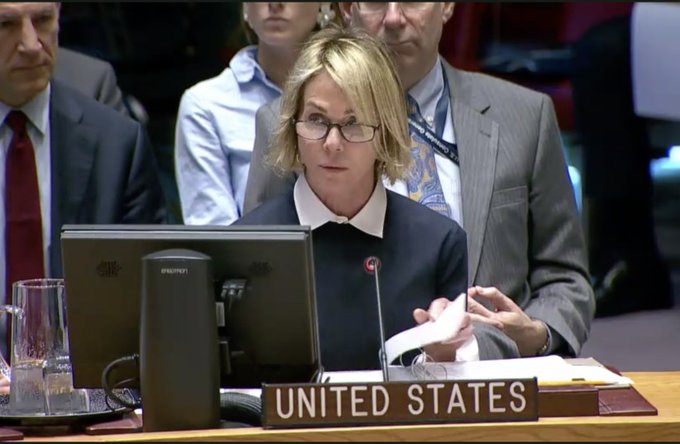
File photo of US Ambassador to the UN Kelly Craft
UNITED NATIONS, Dec. 19 (Xinhua) -- The United Nations Security Council (UNSC) on Thursday heard regrets over the U.S. withdrawal from the Iran nuclear agreement, with calls for Iran to return to full implementation of the deal.
Both Iran and the United States have been putting strain on the landmark deal to monitor Iran's nuclear program, which remains a "cornerstone of international peace and security," Rosemary DiCarlo, the UN's political affairs chief, told the council.
The "full and effective implementation" of the Joint Comprehensive Plan of Action (JCPOA), or the Iran nuclear deal, was "key to ensuring the peaceful nature of Iran's nuclear program and to secure tangible economic benefit to the Iranian people," she said.
DiCarlo said the U.S. decision to pull out of the deal was a source of "regret," as were "the recent steps taken by Iran to reduce its nuclear-related commitments."
According to the UN nuclear watchdog International Atomic Energy Agency (IAEA), Iran since July "has surpassed JCPOA-stipulated limits on its uranium enrichment level, as well as limits on its stockpiles of heavy water and low-enriched uranium," she said.
"It is important that Iran returns to full implementation of the plan, and refrains from further steps to reduce its commitments," she said.
Olof Skoog, EU ambassador to the UN, said that the deal rolled back Iran's nuclear program, and that Iran fully complied with the nuclear-related provisions for three and a half years before the U.S. withdrawal.
Highlighting that the deal is a non-proliferation agreement with obligations on all parties, he expressed regret that the U.S. exit, subsequent re-imposition of unilateral sanctions, and decision not to extend waivers with regard to trade in oil have had a significant effect on Iran's economy.
Meanwhile, the EU lifted sanctions in line with the plan's obligations, he said, welcoming efforts to preserve the agreement in recent weeks.
Vassily Nebenzia, Russian permanent representative to the UN, said the U.S. withdrawal from the deal is "at variance with" Resolution 2231 which specifically backed the deal, and undermines Iran's ability to comply with the agreement.
"The United States cannot demand that Iran complies with an agreement that it itself is undermining," he said.
China's Permanent Representative to the UN Zhang Jun said the deal is crucial to maintaining peace and stability in the region, while actions by the United States might impede Iran's ability to comply with the agreement.
Regarding the drawback of Iran's nuclear-related commitments, he pointed out that all measures taken by Iran are reversible and are subject to the IAEA's monitoring.
He also called on all parties to be cautious in addressing Iran's missile launches, so as to avoid negative impacts on the agreement's implementation.
Speaking of the U.S. sanctions and refusal to extend the waivers, Majid Takht Ravanchi, Iran's permanent representative to the UN, said "in essence," the United States is punishing other countries for honoring their international commitments.
He said the sanctions represent collective punishment of the Iranian general public, targeting vulnerable people to create discontent. The U.S. "bullying" has led to the discontinuation of medicine exports to Iran, he added, citing the case of a 2-year-old patient who lost her life as a result.
He went on to emphasize that Iran will immediately reverse all its measures once full implementation of the nuclear deal is guaranteed by its other participants.


